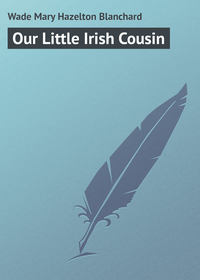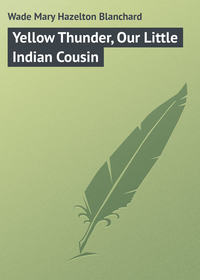 полная версия
полная версияMpuke, Our Little African Cousin
But Mpuke is too sleepy to think about unpleasant things, and in another moment he is dreaming of the roasted elephant that will make to-morrow's feast.
A week passes by. We will visit Mpuke once more as he is eating his early breakfast.
A messenger from the next village comes rushing in to the people. He has run ten miles this morning through the forest paths, and has brought word to Mpuke's father from his own chief. The two men are blood-brothers, and have promised to stand by each other in all troubles and dangers. "Blood-brothers," you say, "what does that mean?" When the chiefs were only boys they went through a sacred ceremony together. An arm of each was cut till the blood ran, then the two arms were pressed together, and the blood was allowed to mingle.
They must never quarrel again. No cruel words or deeds should ever pass between them, because they are now bound together by the strongest of all ties.
But what is the message that causes such a state of excitement? It tells that enemies are approaching. It means war, and preparation for awful deeds. Mpuke's father is asked to come to the help of his blood-brother. Will he join him to meet the advancing foes?
There is only one answer possible; not a moment must be lost. The order is given to sound the war-drums; the people burst into an exciting battle-song; blasts from ivory trumpets can be heard throughout the village; the men cover their faces with charcoal and hastily seek the medicine-man. He must provide them with charms to protect them from danger. Poor fellow, he is the busiest one of all the people, making little packages of beads, shells, and stones for each soldier to wear as a talisman.
The women are at work getting the spears and arrows together; they must also sharpen the knives for their husbands and sons.
These ignorant savages make a hideous sight to our eyes when the fury of war seizes them. It is such a pitiful thing that they are ready to take the lives of their brother blacks for the slightest reason, and that they delight so greatly in war.
Now the men hurry down to the river's side. They jump into their canoes, and are out of sight as soon as they pass a bend in the banks of the stream. Mpuke watches them with glistening eyes; he longs to follow them, but he has been told to remain at home to protect his mother and sisters in case of danger.
He knows already what war means; it was only last year that his own village was attacked. Young as he was, he stood all day behind the spiked wall, sharpened spear in hand, doing his part to defend his home. He was wounded in the leg on that terrible day, and for a long time afterward lay sick with fever. His sister was so good to him during that trying time; hour after hour she sat at his side on the veranda, and kept the flies and mosquitoes from his wound with a broom she made of an elephant's tail.
Mpuke thinks of this as he goes home through the forest path. Suddenly he stops quite still; his eyes roll in terror. A huge serpent lies coiled but a few feet away; he does not notice Mpuke, for his beadlike eyes are fastened on a monkey standing on the ground in front of him. The snake is charming it. He will force it to its own death, and yet he does not stir; it is the monkey that moves. It comes nearer and nearer to the monster; it makes a frightened cry as it advances.
Mpuke knows he cannot save its life, as he has no weapon with which to attack the serpent. He would like to run, but does not stir until the monkey, having come close to its charmer, is suddenly strangled in the folds of its powerful body. The boy does not wait to see the snake devour his prey, but hurries homeward, without once daring to turn round.
The fires have all been put out. The women and children are talking in whispers. They wish to make as little noise as possible while the men are away, lest they be attacked by wild beasts or some passing band of savages.
Night comes; there is no sound of returning warriors. Mpuke sits in the doorway of his home, listening; his mother and sister are beside him. It draws near midnight, and yet there is no sleep for the anxious watchers.
Hark! faintly at first, then more and more plainly, the fighting song of the returning warriors is borne to them on the evening wind. And now they can hear the sound of paddles and shouts of boisterous laughter.
The men must have been victorious or they would not come home so gaily. There are but a few more minutes of waiting before the black heroes enter the village. We call them heroes, for that is the way their families think of them.
The men are tired, excited, and stained with blood. They are bringing home two of their comrades wounded, and the dead body of another. They have six prisoners taken from the enemy. These poor wretches are bound with ropes; they know their fate too well. They are now slaves, and must hereafter do the hardest work for their new masters.
The customs of their own settlement are different from those of Mpuke's village. They will suffer from homesickness, and will have many new things to which they must get used.
It seems strange to us that in travelling a short distance in the heart of Africa the people are found to differ from each other so much in language, habits, and even dress. For, scanty as it is, the style of decoration of one tribe varies greatly from that of another.
For instance, in Mpuke's home we know it is the fashion to have wedge-shaped teeth, while not far away the people think that a really beautiful person must have the teeth pointed. In one village the women wear wooden skewers pierced through their noses; in another, their principal ornaments consist of metal rings in the ears, and metal armlets, anklets, and bracelets.
Among some tribes, the men's hair is braided in queer little tails, while others have it knotted at the back of the head and at the chin in tight bunches.
CHAPTER VI
THE BATTLE FEAST
IT is the day after the battle. Mpuke's father orders his people to celebrate the victory. He tells them to prepare a great feast, as his blood-brother, Ncossi, is invited to come and bring his people.
A great deal of work must be done before the feast is ready. Some of the villagers prepare their nets to catch a certain fish that is rare and delicate. Others get their canoes ready for a hippopotamus hunt; still others search for young monkeys. They must also get a kind of snake that makes a delicious stew.
The children are sent through the fields and woods to gather the rarest and choicest insects. The country is scoured in all directions. The feast will surely be "fit for a king," at least an African king.
The great day comes at last, and the chief Ncossi arrives. He is dressed in the greatest splendour. A chain of leopards' teeth is wound around his neck; a great war knife hangs at his side. One of his cheeks is painted red and the other yellow. The heads of wild animals are tattooed upon his arms. He wears on his head a tall, tattered, beaver hat, for which he must have paid a great price to some trader. He is a hideous object, yet, as he struts along, his followers look upon him with the greatest admiration, and keep exclaiming: "Look at our beautiful chief! Look at our beautiful chief!"
The mouths of the visitors water as they behold the pots boiling over the great fires, and the savoury odours of the meats greet their nostrils.
How glad they are that they have been invited to the fine banquet promised here! They act like happy children out for a holiday. There is no sign in their faces of the cruel side of their natures which showed itself in the battle a few days ago.
And now they gather in a circle on the grass, and begin to devour the good things the cooks spread before them.
Will you share with them this dish of boiled smoked elephant? It is coarse and stringy; I fear you will not care for a second piece, although every one pronounces it delicious. The roasted monkey is fat and tender. You will enjoy it more if you do not allow yourself to think of its resemblance to a baby. The stewed buffalo ribs served with lemon juice and Cayenne pepper are fine, while we should not disdain the turtle soup if it were brought us in the best hotel in America.
The side dishes at this feast are the queerest we have ever seen, – frizzled caterpillars, paste of mashed ants, and toasted crickets. Palm oil has been freely used in the crocodile stew and elephant gravy.
Mpuke's friends and relatives are enjoying themselves hugely. They gobble the good things in the most remarkable manner. They are so busy that they are almost silent. They drink large quantities of palm wine as well as the fermented juice of the baobab-tree. Palm wine is very pleasant and refreshing when it is first made. To-morrow, after the visitors have left, Mpuke will show us how to obtain it. He is an obliging little fellow, and will willingly climb a tall palm-tree to the very top, bore deep holes in the wood, and fasten gourds into which the juice will drip. We should drink it at once, before it changes into the sour, intoxicating liquor drunk so freely at the feast.
Not many days after the celebration, the rainy season began. During this period the rain does not fall all day long, but comes down in torrents for an hour or two every morning.
Very little hunting is done now, but there are such good supplies of smoked elephant and buffalo meat it is not necessary.
Mpuke wakes up one morning with great pain in his head, and it does not go away after he gets up. He says to himself, "I am afraid some bad spirit bewitched me while I was dreaming last night." But he says nothing about his bad feelings to his mother. He is afraid she will think of the sleeping sickness. He does not want her to worry, so he will wait awhile and perhaps the pain will go away.
The sleeping sickness is the most terrible visitor in an African home. There is little hope for the one who has it. Sometimes the sufferer is ill for a few weeks only, but again he may linger for a year before death comes.
The illness begins with a severe headache; next comes swelling of the body, like dropsy; in the last stage, the dying person dozes or sleeps all of the time.
With our little Mpuke, a day and a night pass and his headache grows worse and worse. His body is first hot and feverish, then shivering with a chill. His mother begins to notice how slowly he moves, and how hard it seems for him to do his work.
"You must lie on your mat in the hut, my dear one," she says to the boy. "The charm doctor shall be sent for; he will drive away the evil spirit that is making my child so sick."
The black woman has a strange belief; she thinks that evil beings are always near, ready to work harm. She spends much time in protecting her family and herself from these evil powers by repeating charms and going through queer ceremonies.
She teaches her children to fear spirits in the air, in the water, in the trees, in the ground; at every movement they look for possible trouble from beings they cannot see, yet imagine to be following them. If it were not for such a foolish belief, the black people would be very happy; but they have one protector to whom they turn in all their troubles. They believe that he can drive away the evil spirits; he can bring health to the sick man; he can make charms to ward off the attacks of wild beasts; he can even control the winds and the waters.
CHAPTER VII
THE AFRICAN MEDICINE-MAN
WHEN the crops begin to dry up, it is the medicine-man who has the power to bring rain; when fever visits the settlement, his herbs and charms are alone of any use in relieving suffering. Therefore, when Mpuke becomes ill, the medicine-man is immediately visited.
His hut stands a little apart from the others in the village. It is very seldom that an outsider is allowed to enter the sacred (?) place. After Mpuke's mother has wrapped up her little son, and placed him on his mat, she hastens to the home of the charm doctor, carrying an offering of tobacco and palm wine to the great man.
As she draws near the hut, he appears in the doorway. He wears many chains of metal rings about his body. Funny little packages are tied to the rings, and are supposed to possess the power of working wonders. Feathers of different kinds of birds are sticking out of the packages, while a doleful clanging is made by iron bells at every movement of the "doctor."
When told of Mpuke's sickness, he goes back into the hut and puts on his tall hat of panther's skin. He takes some herbs and wonder-working charms from a dark corner, and comes out looking very solemn and quiet. He rarely speaks to Mpuke's mother as she reverently follows him to her own home.
In a few moments he is standing by the black boy's side. He makes some weird and mysterious motions, and tells Mpuke that he is driving away the evil spirit that has taken hold of his body. He gives the anxious mother a charm made from the hairs of an elephant's tail; this is to be fastened around the boy's neck. She is told to repeat certain words many times a day, and to draw a circle with ashes around the hut to keep bad spirits from returning.
But this is not all that is to be done for the cure of the boy; for the doctor really does know many good uses of herbs. He has discovered that the use of one of these is almost sure to break up a fever like Mpuke's, so he steeps a large dose of this medicine, to be taken during the next three days. Then he goes away as quietly and solemnly as he came; the villagers bow before him in awe as they pass him on his way.
Mpuke is soon strong and well. What cured him? Did the doctor really have the power to drive spirits away? Or was it the medicine the boy swallowed? Of course, his mother believes nothing could have been done without the magic charms, but those who are wise must see that if the herb tea had not been made and swallowed, Mpuke would most likely be still burning with fever.
But Mpuke is now well and strong, glad to be out once more in his canoe; eager to look for honey in the wild bees' nests; chasing the monkeys from the banana-trees; feeding his chickens, and doing a hundred other things beside all these.
But the chickens we hardly recognise as such, they are such poor, scrawny things, with their bodies and feathers all awry; and when Mpuke's mother prepares a chicken stew, the meat is so dry and tasteless that it seems scarcely worth eating. What can be the reason that the African chicken is so much poorer than the American bird? Perhaps it is because it is tormented by such numbers of insects.
This reminds me of something that once happened at Mpuke's home. One night, in the midst of sound sleep, they were suddenly attacked by an army. There were millions, yes, billions, in that army, yet it made no sound as it drew near. It had travelled many miles through fields and forests, and Mpuke's home happened to be in the line of march. That is the reason it was attacked.
For a few moments the sleepers were in a state of great excitement. There was much scuffling, screaming, scratching, and running about. Then all was quiet once more, and the family returned to their mats and dreams.
The strange army was not one of human beings, but, nevertheless, it caused fear and trembling while it stayed. It was composed of ants, much larger than any we have ever seen in our own country. They were under the orders of generals who marched at the sides of the advancing columns. Each ant knew his place and duty. He was ready to bite any living creature that barred his way; and it was a fierce bite, too, for a piece of flesh was taken out each time before he let go.
For some reason unknown to us, the ants were changing their camping-ground and moving to another part of the forest. Such a small thing as Mpuke's home must not be allowed to stand in their way, so they passed through it, and took the people inside by surprise.
"Ouch!" screamed Mpuke, as he woke up to find himself covered by these wise but uncomfortable insects. Then, one after another, the boy's father, that brave warrior, his mother, his sister, and himself, fled from the hut as though a pack of hyenas were after them.
When morning came the ants had departed, but not an insect was left alive in the house. The fat spiders that had spun comfortable webs in the dark corners were now skeletons, a baby lizard lay lifeless in the doorway, and many crickets had fallen victims to the resistless invaders. Worse still! when Mpuke looked for his pet chicken, nothing was left of it save bones and feathers.
Paul Du Chaillu, an African explorer, has written very interesting accounts of the ants found in that country. The wisdom of these little creatures fills us with wonder. Small as they are, they travel in such numbers that even the wild beasts of the forest hasten to get out of their way. They are not fond of the sunlight, and when marching in the day-time they prefer to stop in their journey and dig a tunnel underground rather than pass over an open plain.
CHAPTER VIII
THE GORILLA
BUT we will leave the ants and their wonderful ways for the present, as we wish to follow Mpuke, whose mother has sent him a long way from home to gather some pineapples. The boy's sister carries a large basket on her head to hold the fruit. Pineapples allowed to ripen fully where they grow are much nicer than those picked while still a little green in order to stand the long journey to us. They are so tender that when Mpuke has cut off the top of one he can scoop out the pulp and eat it as though it were oatmeal porridge. And it is so sweet and juicy! It is no wonder the children were glad to go on their errand.
They play hide and seek among the bushes as they run along; they laugh and chatter and joke without a thought of fear, they are so used to the forest. Besides, Mpuke carries a bow and arrow in his hand to be ready in case of need.
They soon reach the place, but discover that some one has been there before them. The fruit lies scattered over the ground. The children look about them in alarm; they speak in low tones instead of the noisy chatter of the moment before.
"Mpuke, do you think a gorilla is near us?" whispers his sister, and the next instant there is a loud crackling and trampling of the bushes.
Ten yards away stands the fiercest, wildest looking creature one can imagine. She is covered with dark, almost black, hair; standing on her short hind legs she is taller than most human beings.
How long her arms look, as she beats her breast in anguish! She does not notice the children hiding behind the trunk of a tree. She is looking down on the ground where her dead baby is lying. Has a passing hunter shot it during its mother's absence, or did it sicken and die? We do not know; we can only listen, breathless, to the mother's cry, too horrible to be described. See! she lifts the dead body in her arms and moves away.
When travellers in the Dark Continent first brought home accounts of this largest and most fearful of the ape family, people could scarcely believe in the truth of their statements, but now every one admits the gorilla to be the king of the African forest.
As soon as the frightened children reach home and tell their adventure, a party of the best huntsmen starts into the forests. If there is one gorilla in the neighbourhood, there must be more. No fruit is safe now; the village itself is not secure so long as the dreaded brutes are near. Besides these reasons for killing them, the people consider the brain of a gorilla the most powerful charm that can be used against one's enemies.
While the hunters are gone, we will listen to a legend Mpuke's mother is telling her children. It shows how the power of a man's mind can conquer even the strength of a gorilla.
HOW THE GORILLA CAMEMy children, this is a story of a far-distant tribe of our race. It was told me by my mother, and she in turn listened to it at her mother's knee. I cannot tell you how old it is, but it is very ancient.
Once upon a time there was a certain king who was very rich and powerful. He had many children, but they were all daughters, and this made him feel exceedingly sad. He longed for a son to take his place when he should die. At length, after many years, he was delighted at the birth of a baby boy.
The child grew rapidly into a strong, bright little fellow, and the king's heart was wrapped up in him. His father strove to gratify his smallest wish, and even divided with him his power over the kingdom. Of course the boy became proud and vain. He was quite spoiled by the flattery of his subjects and his father's lavish presents.
One day, as he was sitting under a tree with a circle of youths about him, he said:
"Oh, how fortunate a boy I am; there is nothing my father would refuse to give me. There is not another youth in the world like me!"
He had no sooner finished speaking than one of his boy subjects dared to make answer: "Sir Prince, there is one thing your father would refuse to give you, if you should ask for it, because he could not do it."
"What do you mean?" asked the proud prince, indignantly.
"It is the moon," was the answer.
The young prince went at once to the king and said: "My dear father, you have never in my life refused me anything, and yet I have even now been taunted that if I were to ask it, you would not be able to get the moon for me. Must I endure this? Say that you will obtain it."
The king was troubled. It seemed that it would be impossible for him to satisfy his child for the first time, and he could not bear it. He sent criers throughout the country to call the wise men of his kingdom together, that he might ask their advice.
When they were all assembled, and heard that the king desired them to find a way by which the moon might be brought down to the prince, they, too, were troubled. They feared the king was going crazy; at least all of the wise men but the one who seemed to be the youngest. He turned to the king and slowly said:
"O King, there is a way by which this thing may be done, but it requires long and great work. All the men of the country will be needed in cutting down the forest and shaping timber. All the women will be needed to plant the gardens, raise crops, and cook food for the men. All the children will be needed to make bark rope to tie the timbers in place, and to hand things to the builders. For, O King, this is my plan:
"Yonder mountain is very high, and I propose that a scaffold be built to cover its entire top; that a smaller scaffold be built on that; a still smaller, on that; and so on, until the moon is reached. Then it can be lifted down and brought to your son."
The king did not hesitate as to what he should do. He began at once to act upon the wise man's plan.
All the men in the country went to work cutting down the forest and putting up the scaffold. All the women set to work to cook for the workmen and to plant new gardens. All the children were kept busy making the bark rope and in running errands for their parents.
A month passed; the first scaffold had been built, and yet another upon that.
Two months, – and now the top of the tower could no longer be seen by the multitude at the foot, for the people of all the countries round about had gathered there to watch the strange work.
Three months, four months, five months were gone, and the head workmen sent word down that now the moon was within easy reach.
At last it was whispered that the king, who had climbed to the top, was about to seize the moon and bring it down to earth. More people, from still greater distances, gathered at the foot to behold the great event.
What happened, my children? At first the moon could not be budged from its place; but then more force was applied. Lo! there was a cracking and snapping, as of a tremendous explosion. A river of fire came flowing down the scaffolds, which were quickly burned, together with all the people upon them, and most of those gathered at the foot of the mountain.
Most wonderful of all, those few grown people who did escape were changed into gorillas, while the children that were saved were transformed into monkeys.
My children, when you look at the moon on bright nights, you will notice dark spots upon it, where the shoulders of the strong man who tried to move it from its place were pressed against it.
Let this lesson be learned from my story: It is not well to gratify all the wishes of children; but only such as the parents think wise and good for them.











